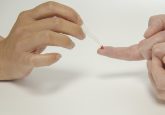Paper chip could provide at-home malaria testing

Researchers at The Ohio State University (OH, USA) have developed a paper-based immunoassay diagnostic chip that could be used to diagnose malaria and other diseases. The simple device uses ionic probes to detect disease-specific antibodies that act as biomarkers, and can be used with no experience, providing an accessible and affordable diagnostic tool for deprived areas.
The test, comprising paper strips, costs approximately US$0.50 per strip. The researchers suggest that individuals could apply a drop of blood to a strip and mail it to a laboratory on a regular basis, providing regular health checks without the need to visit a doctor. In a proof-of-concept experiment, the team demonstrated that test results remained accurate a month after the blood sample was taken, indicating the test’s use in remote environments.
While the test, reported in the Journal of the American Chemical Society, has been recommended for use for malaria diagnosis, the researchers highlight that it can be tailored to detect any disease for which the human body produces antibodies. The test resembles lab-on-a-chip technology, but unlike conventional lab-on-a-chip devices, it is made from paper.
The chip comprises sheets of paper with wax ink channels that penetrate the paper printed with a typical inkjet printer. The wax channels and reservoirs form a waterproof barrier and keep blood samples between the paper layers. Dozens of individual tests are held on each sheet of paper and can be cut into individual strips for use: each strip is approximately the size of a postage stamp.
The paper strips contain synthetic ionic probes that bind to antibodies and which can be detected by a handheld mass spectrometer. Lead author Abraham Badu-Tawiah (The State University of Ohio) commented: “…the ionic probes are hardy. They are not affected by light, temperature, humidity – even the heat in Africa can’t do anything to them. So you can mail one of these strips to a hospital and know that it will be readable when it gets there.”
So far, the research team have demonstrated success of the diagnostic test in the detection of the most common malaria parasite, the protein biomarker for ovarian cancer and the carcinoembryonic antigen, a marker for cancer of the large intestine. The team highlight that the test could be of particular use in patients who have a family history of cancer or who are in remission: they could test themselves at home regularly and send the samples to a lab, and would only be required to visit a doctor if a result came back positive.
The team will license the strips to a medical diagnostics company for further development, and hope that the test could be trialled in a clinical setting within 3 years. At present, they are working to increase the sensitivity of the diagnostic in the hope that it can be developed to test urine or saliva rather than blood.
Sources: Chen S, Wan Q, Badu-Tawiah AK. Mass spectrometry for paper-based immunoassays: toward on-demand diagnosis. J. Am. Chem. Soc. 138(20), 6356–6359 (2016); https://news.osu.edu/news/2016/06/29/papertest/





